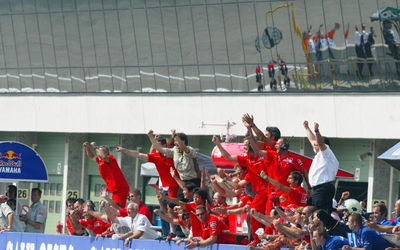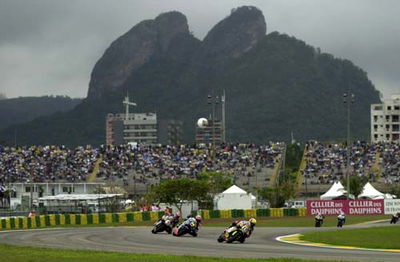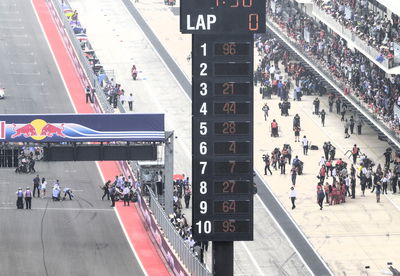Three continents and five weekends fine for MYT.
MotoGP racing is all about speed. But delivering winning speed over a World Championship season requires more than horsepower and handling, it requires major feats of organisation and logistics, especially when the Marlboro Yamaha Team has to compete on three different continents in the space of five weekends.
When the Milan-based crew touches down in Rio this week they bring with them no less than eight tonnes of equipment, part of a total paddock payload of almost 200 tonnes, flown around the world in two Jumbo 747 freight planes.

MotoGP racing is all about speed. But delivering winning speed over a World Championship season requires more than horsepower and handling, it requires major feats of organisation and logistics, especially when the Marlboro Yamaha Team has to compete on three different continents in the space of five weekends.
When the Milan-based crew touches down in Rio this week they bring with them no less than eight tonnes of equipment, part of a total paddock payload of almost 200 tonnes, flown around the world in two Jumbo 747 freight planes.
"This is an incredibly busy time of year for us, the schedule is so tight that everything has to operate smoothly," says Marlboro Yamaha Team director Davide Brivio. "And life was made even more complicated by the latest European race being in Estoril.
"After Rio everything is flown to Tokyo, then Kuala Lumpur, then Melbourne, before returning to Milan, from where it's trucked down to Valencia for the final race. With so much travel and so little time between races we have to prepare all the necessary parts before we leave Europe. It's a massive operation but it's part of our job and everything is properly looked after."
Two weeks ago at bumpy, slippery Estoril, Marlboro Yamaha Team star Carlos Checa scored his first MotoGP pole position, a performance that brings the team to Brazil in optimistic mood, because Rio's Jacarepagua track is also bumpy and slippery. Non-stop improvements to the team's YZR-M1 have made it as fast and fine handling as anything on the MotoGP grid, and further detail set-up work at last week's Estoril tests should give Checa and Max Biaggi an even better chance of success at Jacarepagua, where riders need speed and handling in abundance.
"The last five races of the season look very interesting," continues Brivio. "Max won the M1's first race at Brno last month and I think we have a good chance of winning more races this year. Last time at Rio both Carlos and Max went very well and we're confident that we can be in the fight for victory once again. We have scored two poles and two top-two finishes at the last two races, which proves that we're making constant progress with our bikes, and both our riders are riding really well. Max has already won this year and I think Carlos is also ready to win, a victory would be a fantastic boost for him."
The most recent improvements to the M1 have focused on chassis performance. Last month at Brno Biaggi and Checa received modified chassis that are still being fine tuned for the best-possible handling and turning.
"We found a new direction with the latest chassis during our post-race tests at Brno,"
explains M1 project leader Ichiro Yoda. "This involved a slight adjustment of the bike's centre of gravity, which helped front-end feel, and a small adjustment in the swing-arm pivot area, which improved rear-end traction. We've also been working on the rear shock to make the rear suspension more progressive, so that the riders can get on the throttle earlier. We continued in this direction at Estoril and we'll be working with ?hlins and Michelin to make the bike even better at Rio. I think we can have a good weekend. The track is fast and open, it's the kind of place where the four-strokes should be very dominant."












